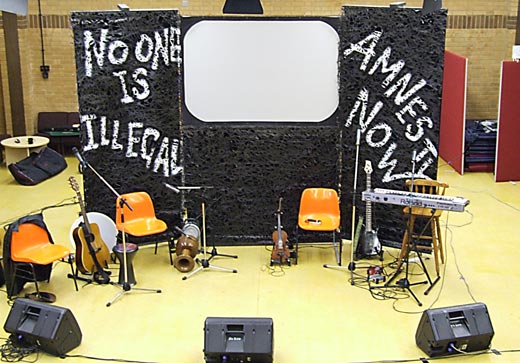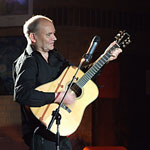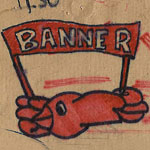
The Emergence of Banner Theatre
‘Banner’ is one of Birmingham’s and Britain’s longest running community theatre groups, proudly and creatively rooted in concerns for civil liberty. In many ways it is a living descendent of the pioneering processes developed by Parker, MacColl and Seeger during making of the Radio Ballads. Banner’s first performance of ‘Collier Laddie’ in 1973, was itself an adaptation of a Radio Ballad called ‘The Big Hewer’ which examined the life, traditions and hardships of coal mining communities. Dave Rogers, current director of Banner Theatre, has described his most recent play ‘Strangers in Paradise Circus’ as a form of ‘video ballad’ (see interview for more details).
Banner performances continued to build upon the classic elements of Parker’s early Radio Ballad form, with the ‘actuality’ of people’s own words used to generate live shows that now included dramatic visual and musical elements on stage. Giving powerful new impetus alongside Parker, other key figures who became involved in the early stages included Rhoma Bowdler, a teacher in Dance and Drama and Wolverhampton; whilst Rogers, another founding member, remains passionately committed to campaigning for social justice with Banner today. In the course of its history, Banner has worked with a host of activists whose culturally diverse experience has helped promote awareness of a wide range of issues in thirty years of performance art.
If the Radio Ballads limitation was that they remained confined in many respects to the select audiences of BBC Radio, one clear breakthrough offered by Banner was to produce performances that could be intimately and spontaneously staged in community halls, workers clubs and pubs. This offered the chance to build a more direct relationship and dialogue with the audiences whose concerns were addressed. This closer participation with the audience was particularly evident during the miner’s strike of 1984-85, when Banner played an important role in giving voice to mining communities and was able to swiftly respond to the political situation.
During the Miner’s Strike, performances of ‘Saltley Gate’ drew on a sense of collective responsibilities and acted as powerful rallying call for pit workers at a time when, at least according to a woman named Thatcher, there was ‘no such thing as society’. The same play was also restaged as part of the anti-pit closure campaigns of the 1990’s. Banner today remains in contact with many of these original audiences and their concerns, but it has also continued to assert its social relevance by addressing other urgent contemporary issues, such as the case of migrant workers and asylum seekers.
Wider Influences
As well as the influence Radio Ballads, Banner Theatre emerged organically from a range of important influences and networks in politics, art and music.
Trade Union leadership in Britain started to take an interest in the capacity of the arts and culture to rally working class issues, as stated in the ‘Resolution 42’ passed by the British Trade Union Congress in 1960. This gave rise to the idea of a worker’s ‘cultural reform’ that provided the inspiration for Arnold Wesker’s ‘Centre 42’ festivals of 1962. These week-long events celebrating work and labour took place in Wellingborough, Nottingham, Bristol, Leicester, Middlesex and Birmingham. As part of the event, Charles Parker created ‘The Maker and the Tool’, an ambitious and elaborate multimedia performance which considered the history of trades such as Birmingham’s Gas Industry. Yet in many ways, the resulting performances were not a popular success, and many audiences felt detached by the traditional socialist values offered by ‘Centre 42’.
Despite the problems attached to the experience, Parker’s development of the ‘Maker and The Tool’ would lay an important foundation for what would come later with Banner. Meanwhile, other forces were influencing the shift from ‘Radio Ballad’ to ‘community arts’. Local interest in the ‘folk revival’ gave rise to the Midland Folk Centre (1965) and the Grey Cock Folk Club (1967), both centres for a local network of musicians and activists to meet and exchange ideas. Also, the work of the political film maker Phillip Donnellan remained highly influential to left wing activists of the time, with documentaries such as The Colony (1964) which considered the African Caribbean immigrant experience, and Gone for A Soldier (1980) which addressed life in the army in Northern Ireland. However, according to Dave Rogers, it is also important to note that alongside these contemporary influences, Banner’s work can be seen to stretch back to left-wing political agitation dramas of the early twentieth century. In this sense, Birmingham is part of a much longer international history of left wing socialist arts tradition- a history which needs to be given more public awareness.
Banner Theatre Today and the Banner Theatre Archive
Banner Theatre today continues to develop its relationship with current social issues that dominate the media. According to Rogers, the current play ‘Strangers in Paradise Circus’ is about ‘challenging the media myths about asylum seekers and refugees…myths like “they’re stealing our jobs”, like “all the decent housing goes to asylum seekers and that’s why ordinary people can’t get access to council houses”….myths about “they only come over here because Britain’s a soft touch”. We handle those one by one and kind of deconstruct them and the kind of object I think really is to challenge racist stereotypes about refugees and asylum seekers” (see An Interview with Dave Rogers). Every Banner performance is an exciting experience, managing to raise awareness of urgent social issues and satirise political systems whilst appealing to a diverse working audience through music, humour and media. It is, as Dave Rogers’s points out on Banner’s website, ‘not a theatre of doom and gloom’ but a living ‘theatre of resistance’ (www.bannertheatre.co.uk).
It is vital to understand that the Banner Theatre Archive is not only of interest for those who are interested in drama. Although Banner has always reached an audience through the direct contact of ‘performance’, the company has also spent over thirty years compiling research on identity, culture and history. Their archive now contains huge volumes of material on social movements represented through a whole array of media including: magazines, journals, printed materials, posters, leaflets, ephemera, audio tapes, performance transcripts and a massive slide collection. These materials could be used to ‘map’ Birmingham’s local relationship with national and international political movements of the last thirty years. See the online catalogue of Banner Theatre in the Connecting Histories collections page for more details.
Author: Dr Andy Green
Image: the set of ‘Strangers in Paradise Circus’ by Banner Theatre, 2007.
Photograph by Dr Andy Green.
|
|

An Interview with Dave Rogers

Banner Productions (1973-2007)
|
